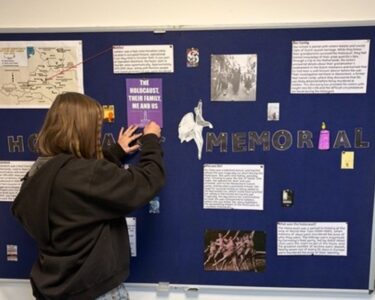To mark the launch of his new book Holocaust Consciousness in Contemporary Britain, Dr Andy Pearce writes on why we must continue to present the case for Holocaust education.
As First World War centenary commemorations become entangled with 70th anniversaries of the Second, it is worth reflecting on the words of Uruguayan writer Mario Benedetti: “Forgetfulness is full of memory”. And the idea that the converse may be true has a particular salience given current trends in contemporary Britain.
We know how the ‘present pasts’ we surround ourselves with are expressions of our politics and preoccupations, and that education systems act as essential conduits in the formation of our collective memory. This is not news to most, and if one needed any reminding, the second round of the ‘battle for the big prize’ which broke out over the recently revised National Curriculum for History was instructive. It was out of the wrangling of 1989-1991 that the Holocaust became a mandatory requirement in England and Wales.
This was a major landmark in the history of our national Holocaust consciousness, laying a foundation for the institutionalisation of cultural memory of the genocide of European Jewry. Since then, the Holocaust has been one of the only constants in the history curriculum and this has undoubtedly been one of the reasons behind its pervasive presence in early 21st Century British culture.
But this development has not followed a progressive, upward trajectory. The incorporation of the Holocaust into the History curriculum has long been undermined by a lack of clarity of purpose and rationale – by both policymakers and teachers. This shortcoming has left teaching and learning open to politicisation and susceptible to cultural fads. In some ways this has tracked what has happened in society more widely, where since the turn of the millennium the Holocaust has been increasingly abstracted and decontextualized: a talisman to which all manner of meanings are affixed by all and sundry.
Fourteen years have passed since the process of institutionalising Holocaust memory was completed by the opening of the Imperial War Museum’s permanent exhibition and the creation of Holocaust Memorial Day. Yet the shapes and hues of our Holocaust consciousness remain contradictory and paradoxical. The incoming Programme of Study for Key Stage 3 History provides an excellent example of this. After an initial framing of the Holocaust as a ‘unique evil’ was rightly dropped, the genocide is now the only compulsory event named under the rubric of “challenges for Britain, Europe and the wider world 1901 to the present day”. Incredibly, given the suffusion of our culture by war commemoration, the First and Second World Wars appear simply as non-statutory content.
However welcome the retention of the Holocaust in the curriculum may be, its positioning raises the real prospect of perpetuating its cultural abstraction. Context, as any historian and history teacher knows, is key and the potential for the Holocaust to be taught without it carries severe implications. It is even more pernicious that because the National Curriculum is not compulsory for academies and free schools, there is no guarantee that students will even encounter the Holocaust within formal education.
Classrooms are not the only places where knowledge and understanding of the past are formulated, of course. But schools are settings where misconceptions can be corrected and inquisitive and critical mind-sets nurtured. Bearing in mind how diffuse the Holocaust is in our society, and the proclivity towards its misrepresentation, it would seem imperative that it feature in all school curricula.
To say that the Holocaust should be taught is not enough: there still needs to be clarity of aim and sound pedagogical purpose. Over the past 20 years an orthodoxy has emerged, with the presumption that education will give students ‘the facts’ to combat Holocaust denial and develop a life-long commitment to ‘never forget’.
These are laudable and worthy intentions, but they are not without complications. As Paulo Friere observed, the constructed nature of knowledge presses against the idea that knowledge is an inert entity that is simply transmitted from teacher to student. In the case of history, substantive knowledge requires conceptual, disciplinary frameworks. Remembering – that is, remembrance tuned in the key of memorialisation – is not something which sits easily with the nature of historical enquiry and independent thinking. Nor, returning to Benedetti, does it prevent forgetting.
Despite the terms of the new National Curriculum and the creation of a Holocaust Commission charged with ‘keeping the memory alive’, the academisation of our education system has created a marketplace where a sophisticated and informed case for teaching and learning about the Holocaust must be made. The Holocaust should be a fixture in our students’ education for a host of reasons, not least because of its capacity to open up those most perennial of questions: just what is education, and what do we want education to do?
Holocaust Consciousness in Contemporary Britain by Andy Pearce has just been published by Routledge.
This blog post was originally written for the IOE blog.



